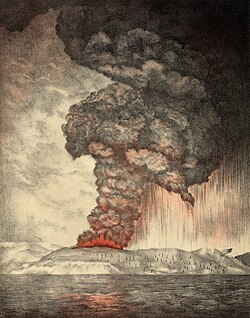For months afterwards, there were spectacular sunsets from the particulates in the air, as well as changes to weather that lasted five years.
If you had been hanging out on the planet Mars at the time, you would have seen the Earth get--and remain for years--considerably brighter as the particulates increased the albedo of the planet's atmosphere.
Westerners living in the area or sailing nearby took notes that reached newspapers on the other side of the globe quickly. It was the first natural disaster that was reported so quickly, and widely. We take this for granted today, but the technologies for communication were new then.
While not the biggest volcanic eruption in the past 1000 years, it happened when communication and science technologies had progressed to such a point that its importance to the science of volcanology could hardly be overstated. It also revealed to meteorologists new information about high-level winds.
In 2003, Simon Winchester wrote a terrific non-fiction book about it, well worth reading if you're as into natural disasters as I am. Also, you could mosey on over to youtube and look for uploaded TV specials on the topic, like this one: https://www.youtube.com/watch?v=MrEIT66oPqU


No comments:
Post a Comment
moderated twice a week, so please be patient!